- Home
- Jon McGregor
The Reservoir Tapes Page 9
The Reservoir Tapes Read online
Page 9
She sat up straighter and made herself comfortable.
Her whole expression was very familiar.
*
There were so many times Ginny had ended up facing Laura like that.
Especially
as she got older.
They were such difficult years.
They kept thinking she would
grow out of it.
They thought fourteen would be the worst age, then fifteen, then sixteen. Kept themselves sane by talking about what it would be like
to have a civil conversation again,
when she was
older.
But they never saw it.
She walked out of the front door one day and she never came back.
She was seventeen.
There was so much silence.
After all the noise. All the slamming of doors, and the shouting.
Laura had never been
violent, but
there was a lot of aggression,
a lot of upset.
They were always on edge. It was difficult to sleep.
Laura would come home at all hours.
When she didn’t come back, they would be worried sick about her. And when she did come back she would be making a racket, causing a scene.
Out of her mind, sometimes. By then they thought she was
involved with drugs
of some sort.
It was exhausting.
So when she left, there was just –
this
silence.
This blessed silence.
As though a storm had passed.
They were worried sick for her, of course. And they missed her.
The pain was physical.
But it was so quiet.
And they slept.
Ginny would never have imagined sleep could be possible with a daughter away,
away in the world, and no idea where she’d gone.
But they slept.
It was one way to escape.
She’d left a note, which didn’t say
enough.
There were letters in the post, and later there were photographs.
She wanted them to know she was okay.
She looked happy. She was
happy
without them.
That was difficult.
The police said there was nothing they could do, once the letters arrived.
If she’s safe and well and she doesn’t want to come home, they said,
there’s nothing we can do.
They were embarrassed, honestly. Ashamed.
They didn’t like the thought of what people would say.
They felt rejected.
They were worried that people would think they must
have been terrible parents,
for their daughter to just
leave, like that.
So they didn’t tell anyone.
They said she’d gone to London, to work.
They said she was staying with a cousin of Jacek’s.
They changed the subject when it came up.
It seems ludicrous, now. But
they thought she’d be back.
People must have known
something wasn’t right.
But people don’t pry.
The letters kept coming, and the photographs. Always with different postmarks.
Later, when they thought about moving house, they didn’t dare.
She wouldn’t know
where to send the letters,
they thought.
There hasn’t been a new picture for six years now,
but there will be. Laura won’t let her down.
She has her own life. Ginny can be happy for her.
She probably has children, now.
A child.
It’s impossible to know, but it seems likely.
She wonders, sometimes, whether having a child
would make Laura want to come back.
She has pictured it,
sometimes.
Laura
at the front door,
with a pram.
Or holding a baby.
Smiling. Apologising.
Asking if she could come in.
Or with an older child, the two of them
holding hands.
The child too shy to talk to Ginny, at first.
Or the child grown old enough to
ask questions, to
want answers, to
make her own way to Ginny’s house.
A strange child standing at the door.
So, of course.
When Ginny saw this girl in the garden,
under the apple tree.
She did wonder.
The girl had so much of Laura about her.
*
She’d asked her to leave, but
she wanted her to say who she was.
She wanted to know who she was.
So she kept her talking.
She asked how she liked the apple, and
the girl shrugged.
She told her she’d picked it a bit early, and it would likely be sour.
The girl shrugged.
She asked if she’d hurt herself coming over the fence.
The girl shrugged again.
Doesn’t it hurt your shoulders, Ginny asked; all that shrugging?
The girl was trying not to smile, Ginny could see.
Ginny asked if she lived locally, knowing full well that she didn’t.
I’m here on holiday, she said.
Because I don’t know what it’s like where you live, Ginny told her,
but in these parts people think it bad manners to go climbing over other people’s fences.
Okay, the girl said.
It sounded as close as she would ever get to an apology.
It was enough for Ginny.
When you leave, she said, I’d prefer you to go out through the front gate here. Like a normal person.
The girl did smile then, finally.
Ginny asked if her parents knew where she was.
The girl said her parents wouldn’t worry about her for a few hours. She said they knew it was safe round here, and they trusted her.
She was very sure of herself.
Will you know how to get back? Ginny asked. The girl nodded.
She stood up, brushing herself off and picking up a bag she’d been sitting on.
My name’s Becky, she said, holding out her hand.
Ginny unlocked the front gate, and told her to get a move on.
Becky squeezed past her, and mumbled something that
may have been thank you. Or may not.
Up close, she’d looked nothing like Laura at all.
But she’d had that spirit.
Ginny wanted to tell the girl’s parents something about this. One day. She wasn’t sure it would help. But she thought they might like to know.
If their girl had gone off
the way Laura did, she’d be,
she’d probably be
okay, Ginny thought.
She was younger than Laura had been
when she left,
but even so.
She’d seemed mature.
She’d seemed sensible.
They live their own lives in the end, no matter what you do.
She’d be okay.
She wanted the parents to know.
14: Jess
Whenever she’d been unfaithful, Jess would prepare a special dinner for herself and Stuart, to make up for it. He didn’t know this, of course, but it made her feel as though amends were being made.
She didn’t think ‘unfaithful’ was even quite the right word. Strictly speaking, yes, that’s what it was. But it wasn’t disloyal. It came from a place of deep loyalty to Stuart, if anything. It was a way of ensuring their marriage could continue.
It was never difficult to arrange. Men were easy to read, and would alwa
ys say yes if she asked them directly. They accepted the terms as she set them out: once only, no talking about it afterwards, total discretion. It was never thoughtless or casual, and mostly extremely pleasant. She enjoyed the anticipation she felt, and the anticipation she saw someone else feeling. The sense of two people stoking a hunger that was bigger than both of them. She enjoyed the raw abandon she felt in a strange bed. Stuart would be hurt if he ever found out, obviously, but she knew that he’d be far more hurt if she left him for the sake of this one thing. It was just a particular form of aerobic exercise, when it came down to it. What sort of a person would break up a marriage for that? It seemed as reckless as leaving someone because they didn’t like playing cricket, or because they’d hung their rowing boat in the shed twenty years ago and not taken it down since.
So it was never guilt that she felt afterwards, exactly. But it did create an uncomfortable feeling of wanting to reconnect, and cooking for him was the best way she knew of doing that.
Tonight’s dinner was going to be a particularly elaborate affair.
*
The girls were staying at a friend’s house, and Stuart had been out at a meeting all afternoon, so she’d had plenty of time to prepare. He was late getting back, but it was probably too soon to worry. He’d gone to settle some business with Woods. The dinner would be a surprise.
Or should that be Mr Woods? She wasn’t sure if it was a surname or a nickname or even his name at all. It was one of those questions you didn’t ask. Some people would be apprehensive about meeting a man like that in the first place, but Stuart had said there was no need to worry. It was all a simple misunderstanding, he’d said.
She chopped some more garlic, and added it to a salad dressing, along with fresh oregano and a splash of lemon juice.
He’d worked hard on the meeting all the same: Land Registry paperwork, a legal opinion, existing contracts. Might as well get this thing resolved in one hit, he’d said. He’d been working hard on everything lately. Things had been getting tight, business-wise.
She weighed out the bulgar wheat and put it to soak. She covered the bowl with the tea towel they’d bought when they’d gone to Morocco. That was years ago, before the children. She poured herself a glass of wine. She checked on the lamb.
The meeting was about money. Most of their problems this year had been money-related. Woods kept some caravans on a strip of land fronting a timber yard that Stuart had recently bought, and had apparently always been paid an access charge by the previous owner. This wasn’t mentioned in the sale documents, and seemed to have no legal basis. It wasn’t even clear that he owned the land his caravans were on. It was a nonsense, Stuart had said.
The timber yard had belonged to Patrick Harris, who had died a few years ago. Cathy Harris hadn’t wanted to sell, but Stuart had offered her a good price. There’d been some bad feeling about it in the village, which Jess hardly thought was fair. It was a good price. But Cathy had seemed rather stilted the last few times Jess had seen her.
The lamb shoulder had been marinading since the night before. She’d waited for Stuart to go to bed, and then scored deep lines through the fat and rubbed it all over with olive oil, garlic, rosemary and crushed juniper. When she’d got into bed he’d told her she smelt nice, wrinkling his nose in that utterly puzzled way she found so affecting. She’d left the lamb hidden at the back of the larder until he’d gone to the meeting, and then blasted it for half an hour before turning the oven down as low as it could go.
She’d never met Woods, but she knew him by reputation. Most people did, around here. Cathy had once told her he was involved in illegal gambling, and Martin at the butcher’s shop changed the subject whenever his name came up. He seemed to be a kind of bogeyman figure, but there were very few specifics. It was simple reputation management, Stuart said. A type of business strategy. A face-to-face conversation would resolve the issue. He would be reasonable about it, Stuart was sure.
She laid the table. She’d ironed the tablecloth, and was using the heavy cutlery his parents had left them with the house. She’d polished the glasses, and put the wine out. She arranged some ivy around the good candlesticks, and laid out the napkins.
*
She checked the time. He really was late now. She popped outside for a moment, on the off-chance she might see his headlights along the road. It was cold and there was a thin coating of frost across the gravel. It was a cloudy night and the darkness felt close. The barn conversions across the yard were a silhouette against the darker hills beyond. The lights from the village seemed a long way off. There were no cars on the road.
Tomorrow she would put the lights on in the barn conversion, when she went over to air the rooms ready for the Shaw family’s arrival. This time of year could be dank even in the middle of the day, and she wanted them to feel welcome. She knew they’d been in two minds about coming at all. She was looking forward to seeing them again, and she wanted it to go well.
They’d come for a fortnight back in August, with their daughter, Becky. She’d invited them as a test-run, before they opened the new holiday lets to paying guests. The whole building process had been so fraught with cock-ups and delays, and they wanted to be sure everything was finally working properly. And the Shaws had been happy to act as guinea pigs. They were old friends, from university days. It had been good to see them again. They’d seemed to unwind over the course of the time they were here. And Becky had made friends in the village. Jess had even picked up, from her older daughter, that there was some kind of infatuation between Becky and the Broads’ son, James, although what that really meant at the age of thirteen was anyone’s guess.
Money had been tight, the last few years. The barn conversions were supposed to work towards solving that, as was the acquisition of the timber yard, but so far they were just deeper into debt than ever. And this business with Woods had stopped them being able to use the timber yard at all.
She went back inside, and checked on the roast potatoes. They were barely golden, and just beginning to crisp. She tossed them around in the pan and put them back in the oven. The sticky smell of caramelising garlic made her think, as it sometimes did, of their honeymoon in Greece. Everything they’d eaten there had been laced with garlic and dripping with oil, and they’d got very messy. They’d spent most of their time eating it half-naked. She’d thought, then, that their appetites would never be sated.
She didn’t know what had changed, for Stuart. Something just seemed to have switched off for him, physically. He was affectionate in other ways, and they still felt close, but there was just this one lack. He wouldn’t discuss it, and didn’t even seem very concerned. It had nearly broken the two of them apart, until eventually she had decided that she wouldn’t let it, and taken the necessary steps.
*
She set out the fish platter, letting it come back up to room temperature. She’d picked up a couple of small trout from the river keeper, who seemed to feel he owed them because the river ran past their property. She liked to fillet them thinly and leave them sitting in lemon juice and wine vinegar for a while, so the flesh had already begun to whiten before she gave them just a hint of heat and set them melting on the plate. Some roughly ground salt. A few cracked flakes of chilli.
The house was quiet, without the girls around. She had a feeling of things being muffled.
She poured another glass of wine, and opened the front door again. The air was sharp, but it came as a relief after the heat of the kitchen. The clouds had thinned and the stars were coming out. She could see the long ridge of Black Bull Hill away to the left of the village lights. And in the distance, from somewhere near the visitor centre, she saw headlights. This would be Stuart, now. He would be okay. She’d known he would be, really. Even with all the talk about Woods, she’d known that Stuart was in no actual danger, no actual physical danger. The man could be unpleasant and stubborn, by all accounts, but this was hardly Sicily. They weren’t talking about broken fingers or kneecaps. She wa
tched the headlights getting closer, and heard the click of the security gates unlocking at the bottom of the drive. She stepped back inside, so that he wouldn’t see her watching and think she’d been worried.
He had this way of holding her, whenever he came home, just tightly enough and for long enough that she would know things were fine with them both. He did this, and kissed the top of her head. He went straight through to the kitchen and started washing his hands. She followed him.
Are you hungry? she asked. I’ve made a spot of dinner. The girls are staying at the Smiths’. I thought we could make an evening of it.
Lovely, he said. Lovely. He was washing his hands very thoroughly, the water steaming hot. She took the last few things out of the oven and carried them through to the dining room. She fiddled with the arrangement of the dishes and the cutlery, straightening the cloth and napkins and lighting the candles. She poured the wine, and carried the glasses back into the kitchen. Stuart was still washing his hands, but as she came into the room he turned the tap off suddenly and reached for a towel. He’d splashed water across his face as well, and for a moment he buried his face in the towel and kept it hidden.
Wine? she said, waiting.
He lowered the towel, and hung it carefully on its rail. He took the glass from her, and smiled, and followed her through to the dining room. It must have been a long meeting, she guessed. He looked tired. He glanced at all the food spread out across the table. It looked like enough for half a dozen people.
You’ve certainly been busy, he said. There’s not an occasion I’ve forgotten about, is there? We’re not expecting anyone else?
No, she said. No one else. Just us.
Great, he said. Great. Well, thanks for this. Looks lovely. Shall we tuck in?
Stuart, she said. Is it sorted?

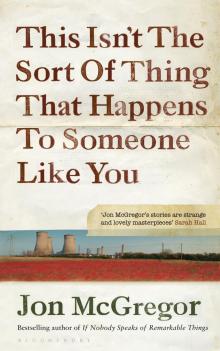 This Isn't the Sort of Thing That Happens to Someone Like You
This Isn't the Sort of Thing That Happens to Someone Like You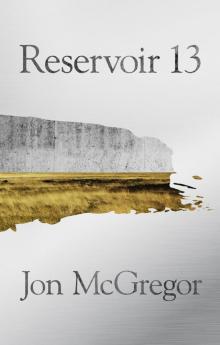 Reservoir 13
Reservoir 13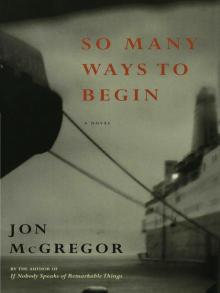 So Many Ways to Begin
So Many Ways to Begin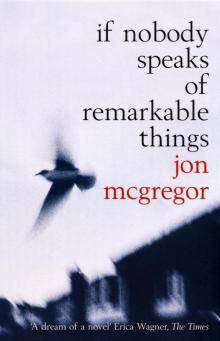 If Nobody Speaks of Remarkable Things
If Nobody Speaks of Remarkable Things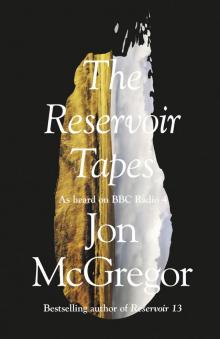 The Reservoir Tapes
The Reservoir Tapes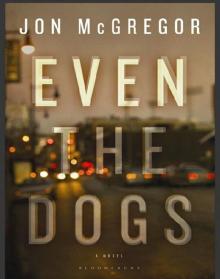 Even the Dogs: A Novel
Even the Dogs: A Novel